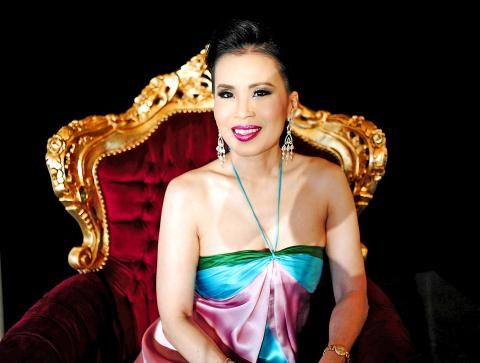A new Thai political party yesterday vowed to obey a command from the king blocking the candidacy of his eldest sister for prime minister in a dramatic reversal that appeared to boost the junta’s chances ahead of next month’s elections.
The announcement effectively blocks Princess Ubolratana Mahidol’s unprecedented bid for the prime ministry and comes after an extraordinary rebuke of the candidacy by King Maha Vajiralongkorn.
The Thai Raksa Chart party, affiliated with the powerful Shinawatra political clan, announced the princess as their candidate on Friday morning.

Photo: AFP
The move looked to rattle the “status quo” and threaten the ambitions of the junta that has ruled Thailand since it toppled the administration of then-Thai prime minister Yingluck Shinawatra in a 2014 coup.
However, the king torpedoed the bid in a sharply worded statement later in the day that said bringing senior royal family members into politics is against tradition and national culture, and is “highly inappropriate.”
Thai Raksa Chart responded swiftly, canceling a campaign event scheduled for yesterday and issuing a statement saying it would respect “tradition and royal customs.”
“Thai Raksa Chart party complies with the royal command,” it said.
Thailand has some of the most severe lese majeste laws in the world and the king’s word is considered final.
Royalist Thais and celebrities praised the intervention on social media after the order, writing: “Long live the king.”
Analysts believe the events that unfolded over the past two days would help the junta consolidate power and tilt the odds in favor of coup leader and Thai Prime Minister Prayut Chan-ocha.
Prayut is standing as prime minister for the Phalang Pracharat party, a group aligned with the regime.
The military has “gained the upper hand,” said Anusorn Unno, a professor at Thammasat University, adding that it is poised to perform well in the upcoming vote.
The election on March 24 is the first since the 2014 coup.
Even before Thai Raksa Chart’s reversal, many said that the palace statement had scuttled the princess’ chances.
“The palace disapproval invalidates her candidacy,” said Puangthong Pawakapan a professor of political science at Chulalongkorn University.
Thailand is a constitutional monarchy and has not had a royal run for frontline office since 1932.
The 67-year-old princess did not address the royal rebuke head-on when she yesterday thanked supporters on her widely followed Instagram account, saying vaguely that she wanted Thailand to “move forward.”
The king did not criticize the princess directly and seemed to focus blame on political party members who brought her on board.

BUILDUP: US General Dan Caine said Chinese military maneuvers are not routine exercises, but instead are ‘rehearsals for a forced unification’ with Taiwan China poses an increasingly aggressive threat to the US and deterring Beijing is the Pentagon’s top regional priority amid its rapid military buildup and invasion drills near Taiwan, US Secretary of Defense Pete Hegseth said on Tuesday. “Our pacing threat is communist China,” Hegseth told the US House of Representatives Appropriations Subcommittee on Defense during an oversight hearing with US General Dan Caine, chairman of the Joint Chiefs of Staff. “Beijing is preparing for war in the Indo-Pacific as part of its broader strategy to dominate that region and then the world,” Hegseth said, adding that if it succeeds, it could derail

CHIP WAR: The new restrictions are expected to cut off China’s access to Taiwan’s technologies, materials and equipment essential to building AI semiconductors Taiwan has blacklisted Huawei Technologies Co (華為) and Semiconductor Manufacturing International Corp (SMIC, 中芯), dealing another major blow to the two companies spearheading China’s efforts to develop cutting-edge artificial intelligence (AI) chip technologies. The Ministry of Economic Affairs’ International Trade Administration has included Huawei, SMIC and several of their subsidiaries in an update of its so-called strategic high-tech commodities entity list, the latest version on its Web site showed on Saturday. It did not publicly announce the change. Other entities on the list include organizations such as the Taliban and al-Qaeda, as well as companies in China, Iran and elsewhere. Local companies need

CROSS-STRAIT: The MAC said it barred the Chinese officials from attending an event, because they failed to provide guarantees that Taiwan would be treated with respect The Mainland Affairs Council (MAC) on Friday night defended its decision to bar Chinese officials and tourism representatives from attending a tourism event in Taipei next month, citing the unsafe conditions for Taiwanese in China. The Taipei International Summer Travel Expo, organized by the Taiwan Tourism Exchange Association, is to run from July 18 to 21. China’s Taiwan Affairs Office spokeswoman Zhu Fenglian (朱鳳蓮) on Friday said that representatives from China’s travel industry were excluded from the expo. The Democratic Progressive Party government is obstructing cross-strait tourism exchange in a vain attempt to ignore the mainstream support for peaceful development

ELITE UNIT: President William Lai yesterday praised the National Police Agency’s Special Operations Group after watching it go through assault training and hostage rescue drills The US Navy regularly conducts global war games to develop deterrence strategies against a potential Chinese invasion of Taiwan, aimed at making the nation “a very difficult target to take,” US Acting Chief of Naval Operations James Kilby said on Wednesday. Testifying before the US House of Representatives Armed Services Committee, Kilby said the navy has studied the issue extensively, including routine simulations at the Naval War College. The navy is focused on five key areas: long-range strike capabilities; countering China’s command, control, communications, computers, cyber, intelligence, surveillance, reconnaissance and targeting; terminal ship defense; contested logistics; and nontraditional maritime denial tactics, Kilby